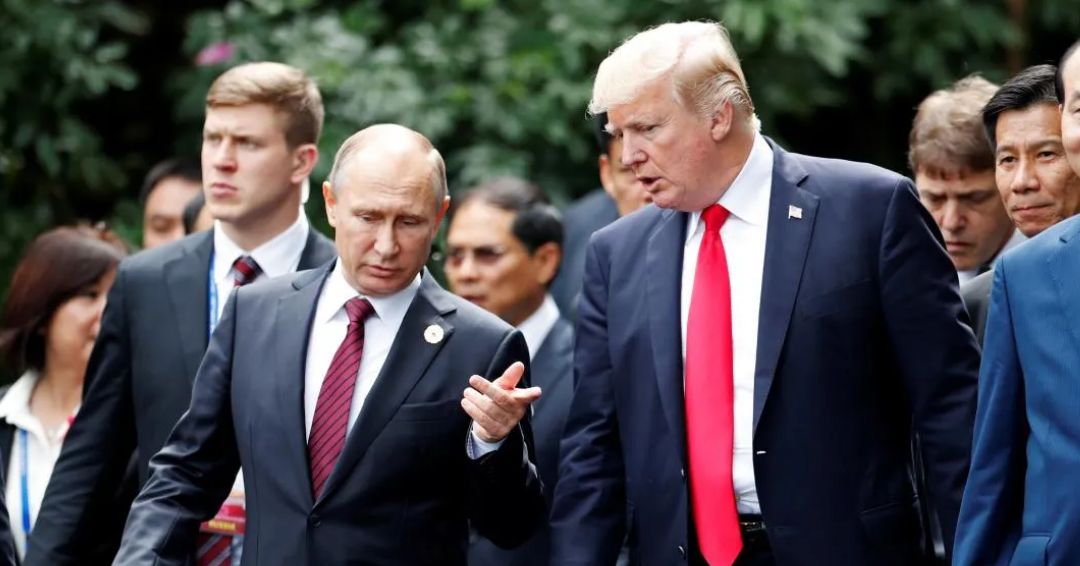President Donald Trump held his first confirmed conversation with Russian President Vladimir Putin on Wednesday, describing it as a “lengthy and highly productive” discussion aimed at ending the war in Ukraine.
The call, which lasted nearly 90 minutes, signals a shift in US policy, with Trump prioritizing a US-backed resolution to the conflict that has dragged on for more than two years.
“We discussed Ukraine, the Middle East, Energy, Artificial Intelligence, the power of the Dollar, and various other subjects,” Trump wrote in a post on the social media platform Truth Social.
“We each talked about the strengths of our respective nations and the great benefit that we will someday have in working together,” Trump added.
“But first, as we both agreed, we want to stop the millions of deaths taking place in the War with Russia/Ukraine.”
The primary focus remained on peace negotiations, which Trump suggested could begin “immediately.”
Trump signals shift in US approach to Ukraine war
Trump’s announcement that negotiations would commence raises questions about Ukraine’s role in the process.
While he stated that he would brief Ukrainian President Volodymyr Zelensky, he did not specify whether Kyiv would have equal footing in the talks with Moscow.
“…we will begin by calling President Zelenskyy, of Ukraine, to inform him of the conversation, something which I will be doing right now…”, he said.
Trump has long been skeptical of Ukraine’s leadership and has not openly expressed strong support for Zelensky.
Meanwhile, the Kremlin portrayed the discussion as a diplomatic breakthrough.
Russian government spokesman Dmitri Peskov said Putin and Trump agreed that “the time has come for our countries to work together” and confirmed that Trump was invited to visit Moscow.
The Russian leader also insisted that addressing the “root causes” of the Ukraine conflict was essential, a position that suggests Russia will demand significant concessions from Ukraine before agreeing to a cease-fire.
Return to Ukraine’s pre-2014 border ‘unrealistic’
While the call between Trump and Putin was taking place, US Secretary of Defense Pete Hegseth made remarks at NATO headquarters in Brussels that suggested a shift in Washington’s position on Ukraine’s territorial ambitions.
He described restoring Ukraine’s borders to pre-2014 levels—before Russia annexed Crimea—as an “unrealistic” goal.
He also stated that the US would not support Ukraine’s NATO membership as part of a peace agreement, echoing one of Putin’s key demands.
Hegseth’s comments, combined with Trump’s phone call, indicate that Washington may push Ukraine toward a compromise that falls short of its stated objectives.
European nations, which have supported Ukraine militarily and economically, are likely to scrutinize any emerging US-Russia framework.
UN welcomes potential for negotiations
The United Nations responded to the news by saying it welcomed any initiative that could lead to peace talks.
UN spokesman Farhan Haq stated that any process involving both Russia and Ukraine “would be a welcome development.”
However, he emphasized that any negotiation should include Ukrainian representatives, a point Trump did not explicitly confirm.
Trump announced that his negotiating team would include Secretary of State Marco Rubio, CIA Director John Ratcliffe, National Security Adviser Michael Waltz, and Middle East envoy Steve Witkoff.
Witkoff was in Moscow earlier this week and helped secure the release of Marc Fogel, an American schoolteacher imprisoned in Russia for over three years.
Notably absent from Trump’s list was retired General Keith Kellogg, whom he previously named as his envoy for Russia and Ukraine.
US-Russia relations amid Ukraine war
For Putin, the call marked a symbolic victory, signaling the end of Western efforts to isolate him diplomatically following Russia’s 2022 invasion of Ukraine.
Since Trump’s reelection, the Kremlin has expressed optimism about a potential shift in US policy, with Putin frequently praising Trump in public statements.
Trump, while occasionally critical of Putin in the past, has often spoken admiringly of the Russian leader.
Following the Ukraine invasion in 2022, Trump described Putin as a “genius,” though he took a different tone after his second inauguration, saying Putin’s war effort had been mismanaged.
“He can’t be thrilled, he’s not doing so well,” Trump told reporters in the Oval Office on his first day in office.
“Russia is bigger, they have more soldiers to lose, but that’s no way to run a country.”
As Trump prepares to navigate the complex dynamics of US-Russia relations, his approach to Ukraine is likely to face resistance from both US allies and members of Congress.
While his administration moves toward negotiations, the extent to which Ukraine will be involved—and what compromises it may be asked to make—remains uncertain.
The post Trump speaks with Putin on ending Ukraine war, says peace negotiations could start ‘immediately’ appeared first on Invezz

